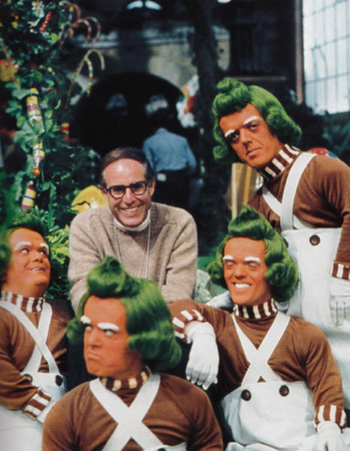Right there on the front page of the Mel Stuart Productions site you’ll find a shot of the director, who has passed away at 83, posing with Oompa-Loompas on the set of Willy Wonka & the Chocolate Factory (1971; and here are some more behind-the-scenes shots). That children’s classic will always be the first to come to mind when Stuart’s name is mentioned, and the enduring love for it was hardly diminished—and may, in fact, have actually been enhanced—by Tim Burton‘s 2005 take on the Roald Dahl story. The inclusion of this piece by Eric Price in this year’s Crazy 4 Cult show only reconfirms Willy Wonka‘s status as a genuine cult film—thanks, surely, in no small part, too, to Gene Wilder‘s portrayal of the title eccentric.
The AP reminds us that Stuart was also an award-winning documentary filmmaker, whose works “include three editions of The Making of the President and, for PBS’ American Masters, portraits of the artist Man Ray and the director Billy Wilder. Stuart’s groundbreaking film Wattstax focused on the 1972 music festival and Los Angeles’ largely black Watts community in the wake of the 1965 riots. In 2005, PBS aired The Hobart Shakespeareans, Stuart’s profile of a teacher in inner-city Los Angeles whose fifth-grade class each year performed a play by William Shakespeare.”
Let’s also mention Four Days in November (1964), the Oscar-nominated doc on the JFK assassination, and If It’s Tuesday, This Must Be Belgium (1969), a cameo-sprinkled comedy about American tourists in Europe.
Update, 8/17: “While Stuart initially considered Dahl’s novel alien to his sensibility, he soon became intrigued by it,” notes Ryan Gilbey in the Guardian. “‘I felt that it wasn’t just a children’s book but rather a complex morality tale about good kids and bad kids, good parents and bad parents,’ he said. ‘Moreover, in the character of Wonka, I saw parts of myself. He didn’t talk down to children or suffer bratty behaviour. I had always treated my children as little adults growing up.'” And as for Wattstax: “His aim was to make more than just a concert movie. ‘Film crews were sent into the streets, churches, barber shops and diners to talk with people about the connection between music and their existence and what it was like to be black in a white America,’ he wrote in 1999. ‘As a reflection of their viewpoint and of the times, there is one particular moment in the film which I found remarkable: a young woman sang the Star-Spangled Banner at the beginning of the concert, and as I looked at the enormous audience I saw that no one stood up during the song.'”
For news and tips throughout the day every day, follow @KeyframeDaily on Twitter and/or the RSS feed. Get Keyframe Daily in your inbox by signing in at fandor.com/daily.




